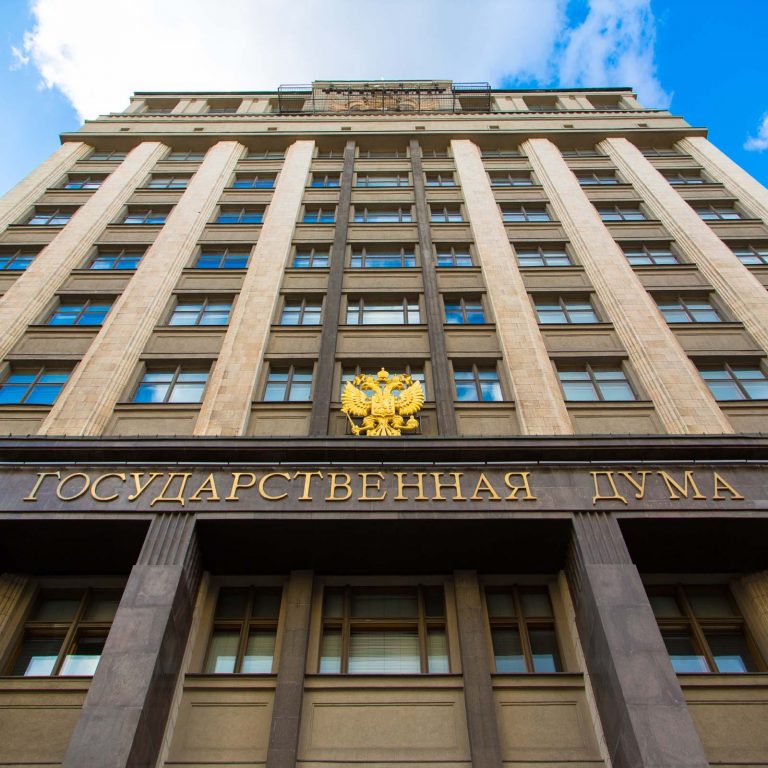
Russian State Duma has approved its first reading of the long-awaited legislation package regulating crypto-related matters and activities. The legal texts, voted almost unanimously, will open the way for legalization of cryptocurrencies in the Russian Federation, including their exchange and circulation under certain conditions. Deputies now have about two weeks to propose amendments before they proceed to final adoption of the three bills.
Also read: Cryptocurrency is Property in Russia, Justice Minister Confirms
The Bills Regulate Crypto Assets, Crowdfunding and Digital Rights
The lower house of Russia’s parliament, the Duma, has accepted and approved on first reading three pieces of legislation tailored to regulate different aspects of the crypto ecosphere in the country. This week, the bills – “On Digital Financial Assets,” “On Attracting Investments Using Investment Platforms,” and “On Digital Rights” – hit the house floor. All of them were voted almost unanimously, the Russian Association of Cryptocurrencies and Blockchain announced on social media. Some interesting ideas, like tax breaks, have been pitched already during parliamentary discussions.
 The first two drafts were introduced on March 20 by a group of deputies led by the chairman of the Financial Market Committee, Anatoly Aksakov, while the third one, which amends the country’s Civil Code, was filed on March 26 by the speaker of the Duma, Vyacheslav Volodin, and the head of the parliamentary Legislation Committee, Pavel Krasheninnikov.
The first two drafts were introduced on March 20 by a group of deputies led by the chairman of the Financial Market Committee, Anatoly Aksakov, while the third one, which amends the country’s Civil Code, was filed on March 26 by the speaker of the Duma, Vyacheslav Volodin, and the head of the parliamentary Legislation Committee, Pavel Krasheninnikov.
The new legislation incorporates legal concepts like “digital right” and “smart contract” and defines cryptocurrencies and tokens as property, not as legal tender. It establish the sequence of actions in a token sale and the rules governing ICO projects. The texts form the basis for legalizing crypto mining but the legal definition of this economic activity will be expanded and refined between the two readings. Other amendments may be introduced in the next couple of weeks. Some proposals, including a moratorium on the taxation of miners, have been discussed in parliament already.
Cryptocurrency Is Electronic Property, Not Legal Tender
The bill “On Digital Financial Assets”, № 419059-7, prepared by the Finance Ministry, was voted by Russian legislators with only one “nay”. It regulates the relations arising from the creation, issuance, storage, and circulation of digital financial assets. The draft also establishes the exact procedures for conducting crypto transactions and concluding smart contracts, including the exercise of rights and the performance of obligations.
Last week, Russian prime minister Dmitry Medvedev said that common words like “cryptocurrencies” and “tokens” will be replaced with the legal terms “digital money” and “digital rights” in the new legislation. The text of this particular draft, however, contains definitions of the original, colloquial terms. It reads: “Digital financial asset – property in electronic form, created using cryptographic tools.” It also says that property rights in this case are certified by making digital records in a register of digital transactions.

“Digital financial assets include cryptocurrency, token,” the document states, emphasizing that these assets are not legal tender in the Russian Federation. According to the authors, tokens can have a single issuer, while cryptocurrencies can have multiple issuers, like the miners. Both can be exchanged with rubles and foreign currencies under rules determined by the Central Bank of Russia (CBR). They will not be considered a mandatory means of payment, account and transfer like the ruble, but individuals and businesses will be able to use them for payments within the frame of the law.
According to Russian media reports, the draft states that crypto purchases and sales should be performed only through providers of exchange services for digital financial assets – brokers, dealers, and corporate entities – acting as custodians. That includes cryptocurrency exchanges which will offer individual accounts and wallets to their customers. The rules governing these activities shall be developed by the Central Bank in consultation with the Council of Ministers.
Crowdfunding and Crowdinvesting Regulated
The bill also describes the sequence of actions involved in issuing digital tokens, stating that their release should be carried out through public offering. Entities behind initial coin offerings (ICOs) will be required to disclose detailed information about their projects. The organizers of token sales need to prove they control at least 5 million rubles (~$81,000) of capital. Banks and non-credit financial institutions won’t be allowed to conducts ICOs. The law also regulates crypto mining and implies that miners should register with the Federal Tax Service, as either individual entrepreneurs or legal entities, and pay taxes.

The Law “On Attracting Investments Using Investment Platforms”, № 419090-7, regulates specifically crowdfunding and crowdinvesting in Russia. The draft reads that both legal entities and individual entrepreneurs can be involved in such activities and prescribes the norms that the organizers of digital fundraising should abide by.
According to its provisions, private citizens can participate in crowdfunding without any registration but the investment platform operators should be registered with the CBR. The bank will also determine the maximum amount an “unqualified investor” can spend on a single project as well as and the limit of their yearly investments in digital tokens.
Only Tokens with Economic Value to Be Recognized as ‘Digital rights’
 The third draft passed on first reading, the bill “On Digital Rights” – № 424632-7, amends the Russian civil law. It introduces basic provisions allowing legislators to regulate the market of tokens and cryptocurrencies and creating conditions for digital transactions. The text develops the legal concept of “digital right” to define tokens.
The third draft passed on first reading, the bill “On Digital Rights” – № 424632-7, amends the Russian civil law. It introduces basic provisions allowing legislators to regulate the market of tokens and cryptocurrencies and creating conditions for digital transactions. The text develops the legal concept of “digital right” to define tokens.
According to the authors, only tokens with significant economic meaning will be recognized as digital rights, unlike loyalty points or virtual coins used in online gaming, for example. A holder of a “digital right” is described as a person with unique access to the coin’s digital code.
Besides regulating the circulation of tokens and the execution of token transactions, the law is also expected to ensure judicial protection for their owners. The introduction of digital rights creates a legal basis for taxation of economic activities related to token sales, as well.
Do you think the new legislation will open the way for mass adoption of cryptocurrencies in Russia? Tell us in the comments section below.
Images courtesy of Shutterstock.
Make sure you do not miss any important Bitcoin-related news! Follow our news feed any which way you prefer; via Twitter, Facebook, Telegram, RSS or email (scroll down to the bottom of this page to subscribe). We’ve got daily, weekly and quarterly summaries in newsletter form. Bitcoin never sleeps. Neither do we.
The post Russian Duma Adopts Three Crypto Bills on First Reading appeared first on Bitcoin News.
from Bitcoin News https://ift.tt/2kmjQWZ
via BITCOIN NEWS
from BITCOIN NEWS https://ift.tt/2s9GQvC
via Bitcoin News Update